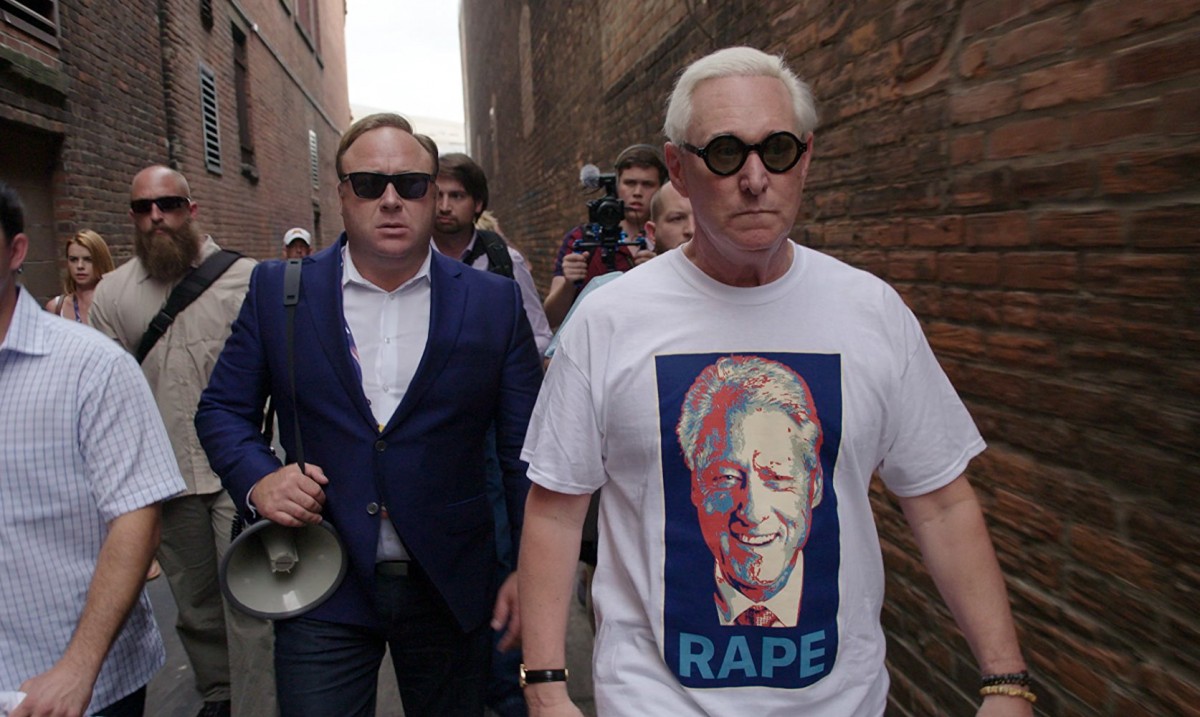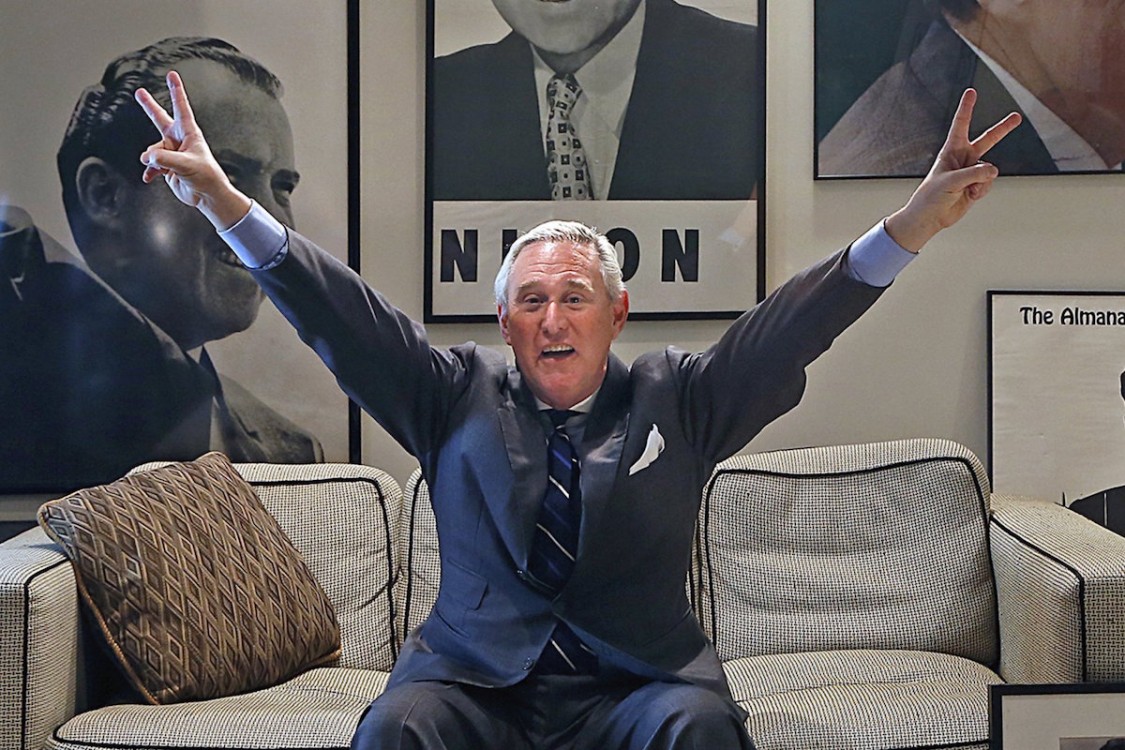The ever-despicable Roy Cohn, who assisted Joseph McCarthy's Communist witch hunt of the late 1950s, is quoted in a 1970s video calling Donald Trump “a genius.” Fast forward four decades and we now have a treasure trove (bigly) of examples attesting to the billionaire president's actual mental capacity. They mostly involve Trump proclaiming how great he is or how terrible others are, through tweets blasted on a daily basis. What's incredible is how conservatives, from the blue collar to the grossly rich, still seem to support him no matter what – even after this week's neo-Nazi covfefe. Do they honestly believe Donald Trump is the best man for the job? Do they?
"Get Me Roger Stone" may just hold the answer, albeit a brutally and depressingly honest one. The new Netflix documentary, co-directed by Morgan Pehme, Dylan Bank and Daniel DiMauro, isn’t just a biopic on the political strategist and self proclaimed “agent provocateur” Roger Stone. It's a blueprint of sinister, cut-throat realpolitik and its execution throughout the dirtiest presidential campaign in recent memory.
The takeaway: Those who want to win the hardest care not for facts, morality, truth or what’s best for the country. Rather, they care about fulfilling and justifying their own beliefs. Stone comes off as cocky and confident, but deep down he needs us to take his views seriously. If he wasn’t so in love with the game, he’d be even more dangerous than he already is.
In "Get Me Roger Stone," made in almost Terrence Malick-style, we follow the white-haired dandy as he lays out his routine of plans and tricks – tricks that have, over a lifetime, led him to being described as a sleazebag and things much worse. The man exists in a sort of self imposed shadow dimension, whispering into the ears of those he seeks to manipulate, and later finding ways to avoid legal consequences for his actions.
From his Watergate involvement in the Nixon administration, to advising Ronald Reagan on how to win the white, working class Catholic vote, to his protest mongering during the 2000 election recount in Florida, Roger Stone has had his hands in the pockets of Americans for decades. Personal gain? Sure. Making America great? If that happens, awesome. The degree to which he snuck his way into America's major political moments of the last half century, and seemed at times to be personally guiding history, is staggering.
What "Get Me Roger Stone" makes clear, however, is that the man himself is kind of strangely humble and modest about his exploits, content to smirk with a martini in hand rather than defend himself against someone else’s claims about his bad behavior. On the contrary, he celebrates his bad behavior. If he went further and passionately into detail, he might be held accountable after all. To others, and maybe even to himself.
The movie succeeds not only because of its access to crucial political and media figures – Paul Manafort, Donald Trump himself, and a slew of top-level journalists – but because it is actually able to pull information and interesting comments from them, juxtaposed with historical insight and context.
When Stone criticizes Bill Clinton’s sex scandals, the film likewise reveals that Stone had some of his own erotic proclivities as well. When Stone shows off his Nixon tattoo as a symbol of never giving up, we see footage of Nixon resigning. There is a sense of humor to the nonsense Stone spouts, at least up until the moment when the movie transitions from past to modern day.
2016 is a time, above all, when money talks and even walks. We wanted to believe he wouldn’t win. We wanted to believe it so badly. But Stone is there to tell us why it must be so. In a most disgusting episode, the film reaches its climax with the surprising – and unsurprising – victory of Trump and the alt-right (perhaps after this week they'll be called the alt-reich). Stone and friends opened the floodgates and there is no going back. Through loopholes and hocus pocus, through “legal” yet unseemly ways, through throwing away the traditional playbook and carving out a new landscape of what is conceivable in politics, Stone helped enable the lowest common denominator to become victorious, implanting him as leader of the free world. And he revels in it all, including in your hatred of him.
The filmmakers of "Get Me Roger Stone" are often referred to by the drink-loving Stone as "pinko liberals," but overall “good people.” A conservative newsman responds not quite so favorably, but the cameras push on. To watch this film is to witness the inhumanity of humanity: the ones who understand its weaknesses and profit off them. If you recall, Pro Wrestling was really popular in the late 1990s for dramatizing the employee vs employer conflict through Stone Cold Steve Austin; it turned real labor issues into dramatic and athletic soap opera. Roger Stone for decades had been doing something similar but on a bigger, wider canvas and with a violent yet steady brushing hand.
Is Stone a true believer at the end of the day? Do he and others really think Trump is a genius? It doesn't matter much one way or another. What matters is that Stone's strategy worked. He and his people won. What matters is that now, a rumor that Facebook’s Mark Zuckerberg could run for president in 2020 is considered plausible and exciting.
Ending on an empowered shot of Trump Tower, rising up high and making us cower from below, "Get Me Roger Stone" is Howard Beale at the end of "Network": defeated and broken, telling viewers about hopelessness. He was no longer good for ratings and was ultimately assassinated for this. Read into it what you will. A documentary that is less a reflection and more a flat dreading of what’s to come – it almost knocks the wind out of your sails, huh America?
Rating: 5 / 5
Bill Arceneaux is an independent film critic from New Orleans and a member of Southeastern Film Critics Association. Follow him on Twitter at @billreviews.
3 WAYS TO SHOW YOUR SUPPORT
- Log in to post comments














